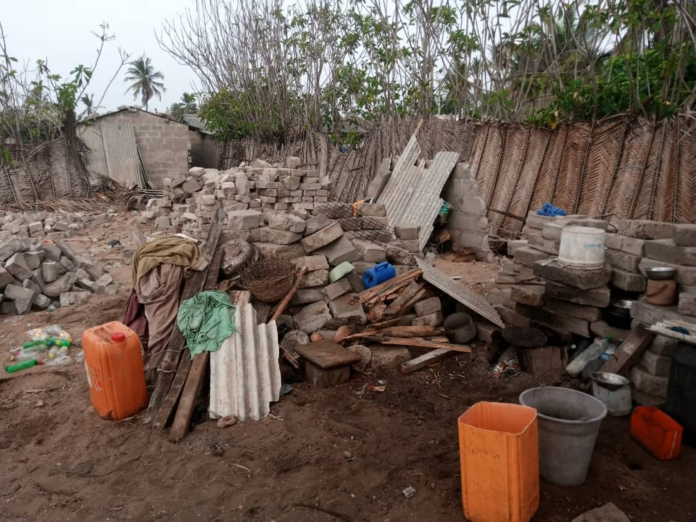Residents of Salakope, Agavedzi, and adjoining coastal communities in the Ketu South Municipality of the Volta Region are reeling from the devastating impact of tidal waves that have swept through their towns, leaving behind a trail of destruction.
Homes have been submerged, properties lost, and livelihoods disrupted, as residents express frustration over the persistent nature of the crisis.
For decades, communities along this coastal stretch have faced the recurring threat of tidal waves and sea erosion, a situation worsened by climate change and rising sea levels.
The latest disaster, which began on February 1 and is expected to continue until February 4, has heightened fears that the already fragile Keta-Havedzi-Denu-Aflao road network could be completely wiped away.
Residents are calling for urgent action from the government to address the crisis. Tourism promoter Joel Deque, who has been advocating for sustainable solutions to coastal erosion, lamented that the situation has only worsened over the years.
He emphasized the need for the government to expedite the second phase of the Blekusu Sea Defence Project, which was initially promised to cover an 8-kilometer stretch but has yet to be completed.
“This problem has persisted for decades, but it is getting worse every year due to climate change, rising sea levels, and aggressive erosion activities. The government must critically look at this, especially with the West Africa Coastal Areas Management Program (WACA ResIP 2) coming into play, of which Ghana is a beneficiary. This is a crucial opportunity to act,” Deque stated.
The Keta-Havedzi-Denu-Aflao highway, a major transport artery in the Volta Region, is under serious threat as the distance between the road and the sea at Salakope and Agavedzi has narrowed to less than 50 meters. Experts warn that if the tidal waves persist, the coastal road could be eroded, cutting off vital transport links and leaving communities stranded.
Deque stressed the urgency of the situation, warning that the ongoing spring tide, which started on February 1 and is expected to last until February 4, could lead to further devastation if immediate measures are not taken.
“We can not continue to watch as our communities are swallowed by the sea. This is a disaster in the making, and the government must act now before lives and critical infrastructure are lost,” he added.
Coastal erosion in Ketu South has been a longstanding problem, with previous tidal waves displacing thousands of residents and destroying properties worth millions of cedis.
The first phase of the Blekusu Sea Defence Project, which was completed a few years ago, provided some relief to communities along that stretch. However, with the second phase yet to be implemented, many towns remain vulnerable to the relentless onslaught of the sea.
The WACA Resilience Investment Project (WACA ResIP 2), an initiative aimed at strengthening coastal resilience in West Africa, presents a lifeline for affected communities. However, residents are demanding speedy implementation of interventions under this project to safeguard lives and property.
With growing pressure from residents, environmental activists, and tourism stakeholders, the government is being urged to prioritise the completion of the Blekusu Sea Defence Project and integrate long-term climate adaptation measures to protect Ghana’s coastal communities.

